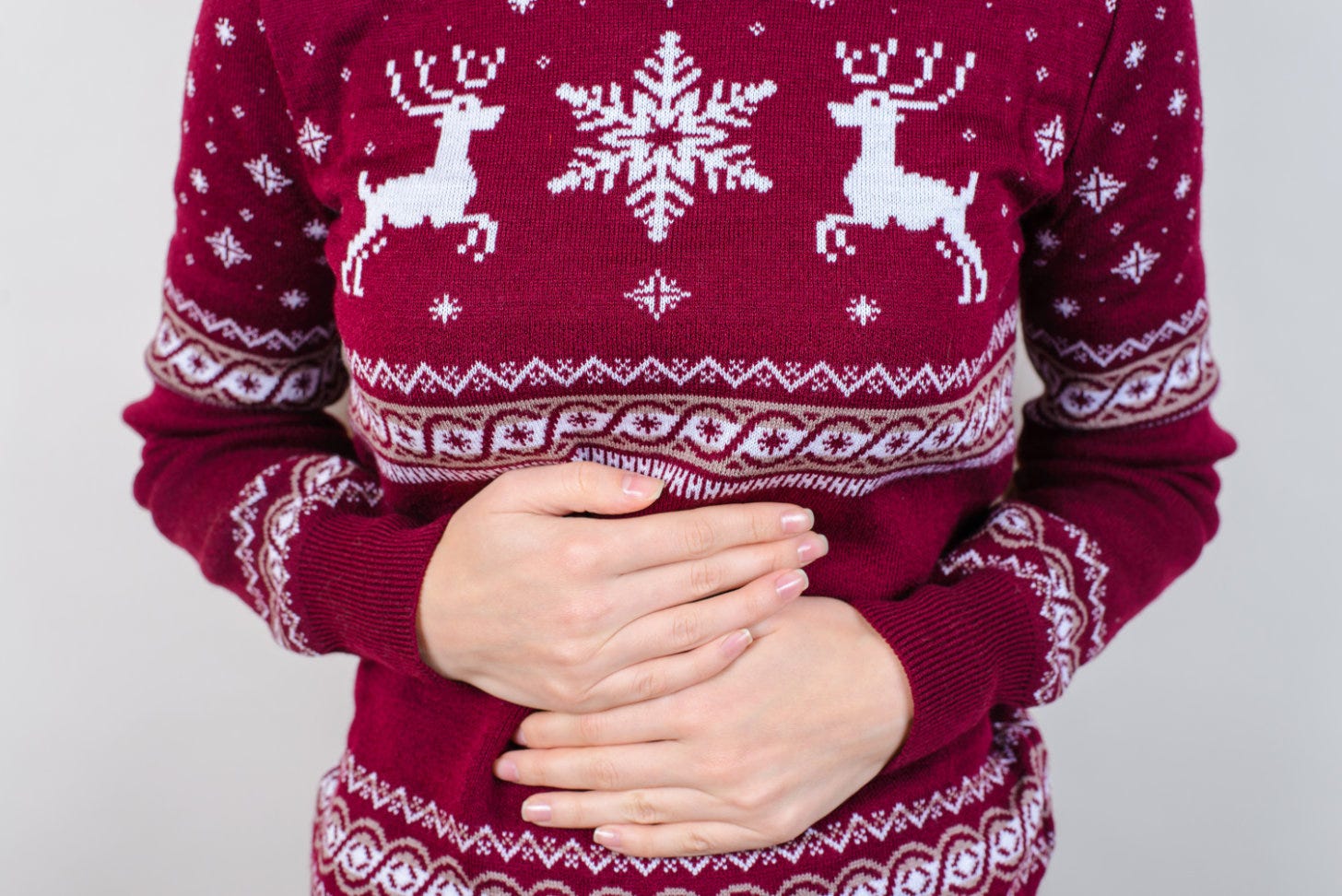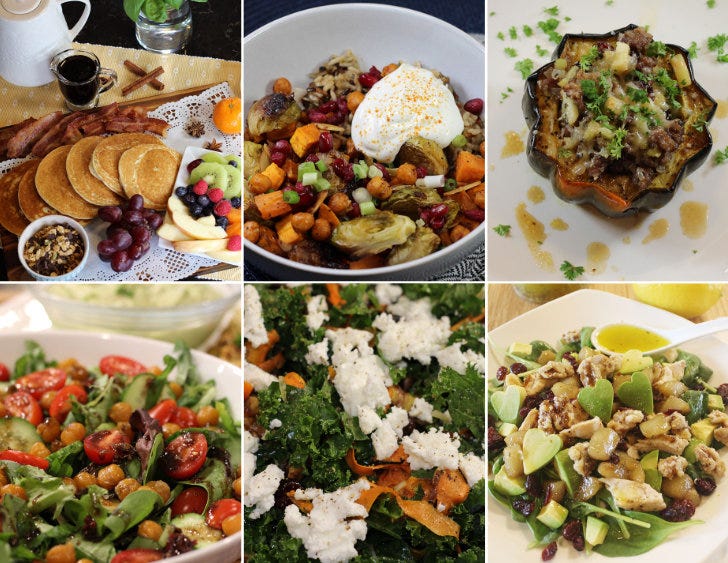Welcome to this week's installment of Live Fully Nourished. I’m Kymberley - the coach, cook, creator, and publisher of GfreeDeliciously.
Gut Health for the Holidays: Maintaining Balance and Digestive Wellness
Welcome everyone!
How are you holding up? I hope you survived your Thanksgiving celebrations without any tummy troubles this year.
The holiday season is a time of joy, celebration, and indulgence. From lavish meals and sweet treats to festive drinks and late-night parties, it's easy to get carried away and let our healthy habits slide. However, as we dive into this time of feasting and merriment, it's crucial not to neglect our gut health.
The gut, often referred to as the "second brain," plays a significant role in our overall wellness. It's home to trillions of microorganisms, collectively known as the gut microbiome, which not only aids in digestion but also affects our mental health, immune system, and nutrient absorption. Taking care of our gut health during this busy season can make all the difference in how we feel and, ultimately, how we enjoy the holidays.
In this installment of Living Fully Nourished, I’ve pulled together my best tips to help you maintain a healthy gut throughout the festivities:
My Seven Best Tips for Maintaining A Healthy Gut Through the Holidays
#1 Prioritize Fiber:
The abundance of rich, heavy foods during the holidays can overload our digestive system. So, incorporating fiber-rich foods like fruits, vegetables, whole grains, and legumes can support bowel regularity and ensure proper digestion. Aiming for at least 25 grams of fiber daily is recommended, and don't forget to include colorful salads, roasted vegetables, and fruit platters in your holiday spread. Here are a handful of recipes to incorporate into your menu throughout the holidays:
How to Make A Gluten-Free Pancake Board (Breakfast Charcuterie Platter)
Roasted Veggie & Wild Rice Buddha Bowls
Apple & Sausage Stuffed Acorn Squash
Roasted Chickpea Salad with Balsamic Dressing
Easy Roasted Carrot, Cranberry & Goat Cheese Kale Salad
Bourbon Poached Pear & Chicken Salad with Lemon Poppyseed Dressing
#2 Stay Hydrated:
Alcohol, sugary drinks, and a busy schedule can lead to dehydration. Water is essential for maintaining optimal gut health. Drink adequate water throughout the day to facilitate digestion, support detoxification, and keep your gut running smoothly. The best way to calculate the amount of water your body needs daily is to divide your weight by two and drink at least that amount in ounces of water daily. For example, if you weigh 130 pounds, half of 130 is 65. So, drinking at least 65 ounces of water daily should suit your body weight. But that all changes if you choose to indulge in alcoholic beverages. When consuming alcohol, alternate each cocktail with a glass of water to stay hydrated and to help prevent over-consumption.
#3 Mindful Eating:
Amidst the hustle and bustle, it's easy to gobble down meals without paying attention. My best advice is to slow down, savor each bite, and listen to your body's cues of hunger and fullness. Mindful eating enhances the digestive process, allowing our body to absorb nutrients effectively. Take time to enjoy holiday meals' flavors, textures, and aromas, promoting better digestion and reducing the risk of overeating.
Understanding Digestion and Naturally Occurring Digestive Enzymes
Naturally occurring digestive enzymes are proteins your body makes to break down food and aid digestion.
Digestion begins in your mouth. When you eat a meal or a snack, the saliva starts breaking down the food as you chew. The more you chew, the more food is broken down into a form the body can absorb.
There are a lot of different points in the digestive process where enzymes are released and activated. Your stomach, small intestines, and pancreas all make digestive enzymes, with the pancreas being the enzyme “powerhouse” of digestion. It produces the most important digestive enzymes, which break down carbohydrates, proteins, and fats.
Types of Digestive Enzymes in the Body
There are many digestive enzymes. The primary digestive enzymes made in the pancreas include:
Amylase (made in the mouth and pancreas; breaks down complex carbohydrates)
Lipase (made in the pancreas; breaks down fats)
Protease (made in the pancreas; breaks down proteins)
Some other common enzymes are made and stored in the small intestine, the liver, and found in the skeletal muscles, including:
Invertase (breaks down sugars)
Lactase (breaks down lactose)
Sucrase (breaks down sucrose)
Glucosidases (carried through the bloodstream as a source of energy for the body’s cells)
Some people don’t have enough digestive enzymes, or their bodies don’t release them as they should. This means they can’t break down certain foods and absorb nutrients.
Two types of digestive enzyme insufficiency with a tie to celiac disease include:
Exocrine pancreatic insufficiency: EPI occurs when your pancreas doesn’t produce enough of the enzymes necessary to digest carbohydrates, proteins, and fats.
Lactose intolerance: Your body doesn’t produce enough lactase, so you might have problems digesting the sugar naturally found in milk and dairy products.
#4 Probiotic Power:
Probiotics are beneficial live bacteria organisms that make up the good bacteria in your gut. They aid in maintaining a balanced gut microbiome. Sometimes, people confuse probiotics and enzymes. Both affect your digestion but in very different ways. Probiotics help keep your digestive tract healthy, supporting your enzymes' work. Unlike enzymes, probiotics do not have the ability to break down or digest food components.
You may have heard about or tried adding fermented foods (like sauerkraut, kimchi, kefir, and yogurt) to help introduce friendly bacteria into your gut, enhancing digestion and supporting your immune function. But while these foods support the work that probiotics do, you may want to re-think solely relying on these foods for optimal gut health. It’s essential to understand that these “foods made through microbial growth and enzymatic conversions of food components” are not interchangeable. If opting for supplements, choose a high-quality probiotic containing various strains to maximize the benefits.
#5 Enhancing Your Diet with Foods That Contain Natural Digestive Enzymes:
Naturally occurring digestive enzymes are proteins your body makes to break down food and aid digestion. Digestion is the process of using the nutrients found in food to break down food particles, giving your body energy, helping it grow, and performing its vital functions. During the holidays, when rich, indulgent foods are on the menu, enhancing your diet with these foods may provide the extra support your digestive system seeks.*
Foods That Contain Digestive Enzymes
Apricots: contain invertase to help break down sugar
Avocados: contain lipase to help break down fats
Bananas: contain two digestive enzymes—amylases and glucosidases – which both help to break down carbohydrates
Ginger: contains zingibain, a protease that helps to break down protein
Raw honey: contains amylase, protease, diastase, and invertase that help break down both carbohydrates and protein
Kiwi: contains actinidain, which helps aid in the digestive process
Mangoes: contain amylase to help digest carbohydrates
Miso: contains lactase, lipase, amylase, and protease, plus beneficial probiotics to help support the digestion of several different types of food
Papaya: contains protease to help break down protein
Pineapple: contains bromelain, a protease, to help break down protein
Fermented foods (e.g., sauerkraut, kefir, etc.): contain several different enzymes to support overall digestion as well as gut health
*It’s important to note that no “real” evidence suggests that enzyme-rich foods such as avocados, pineapples, and fermented foods can help digestion. You’re better off building a well-balanced diet that contains fresh fruits and vegetables, lean proteins, and whole grains. These foods will naturally help support the work your digestive enzymes are already doing. Always consult a healthcare professional to find the proper enzymes for you.
#6 Manage Stress:
The holiday season can be stressful, which can directly impact our gut health. Chronic stress affects the balance of gut bacteria and can lead to digestive havoc, damage and destruction, and even gut disorders. Engage in stress-reducing activities like yoga, meditation, and deep breathing exercises to keep stress levels in check and support a healthy gut.
#7 Sleep Well:
Amidst the excitement of social gatherings and early morning preparations, prioritizing sleep is essential. Lack of sleep disrupts the gut-brain axis, altering the gut's microbial balance. Aim for 7-9 hours of quality sleep each night to allow your body to repair, regenerate, and maintain a healthy gut microbiome.
I’m very passionate about natural remedies, holistic habits, and lifestyle changes to improve everyday health, so unless there’s an absolute need for medicine, I’m all in for trying gadgets, gizmos, essential oils, and natural non-medicine solutions that help to do the trick.
After recent weeks of short sleep nights for dear Hubby and me, I invested in a sunrise alarm clock that lulls us into a deep sleep with night sounds and has the ability to brighten our bedroom to wake us in the morning graduuuuually.
Though I have to admit, I’ve only used the sunrise feature for a time or two. It’s not that I wouldn’t love to use the feature more. It worked perfectly. But I’m an early riser (too many years of Dolly Parton 9-to-5 with a career) waking up on my own. Dear Hubby is the opposite, telling me, “All those years of 5:30 a.m. breakfast has earned him the right to sleep until 8-ish - or so...” So the sun remains set until our windows are flooded with true sunlight. 🌞
That sums up this post installment and my best tips for maintaining a healthy gut through the holidays.
Taking care of your gut health should be a priority year-round, but it becomes even more crucial during the holiday season when we're faced with tempting delights. By following these tips and making conscious choices, you can enjoy the festivities while maintaining a healthy gut that will keep you feeling your best throughout the holidays and beyond. Your body and mind will thank you for it!
Please let me know if there are any more tips that you have found to work for you.
I wish you a great, healthy start to the holiday season!
Feel free to reply to this email with your questions! Or you can always comment below. 🍂
Have a great weekend.
XOXO,
- Kymberley
Like what you’re reading? Get your paid subscription now…
Free and Paid Subscribers and Founding Members of this eNewsletter receive an invitation to create a Site Pass Account at GfreeDeliciously.com, with membership plan benefits above and beyond our Tasty, Tried-and-Tested Recipes, Healthy Eating Advice & Inspiration. Pass members get invites to private online events, groups, workshops, downloads, freebies, select eBooks, meal plans, exclusive discounts, occasional giveaways, etc.
Have questions? Just reply to this email. Your subscriptions support this small business and are much appreciated.






